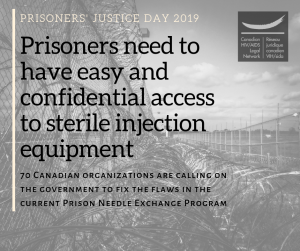PRISONERS’ JUSTICE DAY HIGHLIGHTS FUNDAMENTAL FLAWS WITH GOVERNMENT OF CANADA’S CURRENT PRISON NEEDLE EXCHANGE PROGRAM
The following statement is issued by the Canadian HIV/AIDS Legal Network (“Legal Network”). Comments can be attributed to Sandra Ka Hon Chu, Director of Research and Advocacy.

August 9, 2019 — This Prisoners’ Justice Day (August 10), as prisoners fast for 24 hours in solidarity and remembrance of those who have fought and died for better treatment in prisons, organizations across Canada are urging the federal government to fix the flaws in its current “Prison Needle Exchange Program” (PNEP). Seventy health and human rights organizations, which represent more than 286 member groups with tens of thousands of constituents Canada-wide, are speaking with one voice. What we’re saying is clear, evidence-based, and firmly rooted in health and human rights: Prisoners need to have easy and confidential access to sterile injection equipment to protect their health and save their lives.
The Correctional Service of Canada (CSC) began implementing its PNEP in 2018 in some federal prisons, but details of how this program actually functions reveal serious deficiencies that fly in the face of public health principles and professionally-accepted standards and are contrary to The United Nations Standard Minimum Rules for the Treatment of Prisoners (the Nelson Mandela Rules). Most fundamentally, the PNEP violates prisoners’ confidentiality in many ways creating unacceptable barriers to access. No working program in the world uses the approach currently adopted by CSC. As a result, prisoners continue to be exposed to the risk of HIV, hepatitis C, and other harms to their health. There is no justification for this approach.
At the same time, correctional officers across Canada are protesting the PNEP, claiming that the program represents a serious threat to their safety. Yet, the evidence shows that in more than 25 years of functioning prison-based needle and syringe programs, there has not been a single reported incident of assault with needles from such programs anywhere in the world. Occupational safety is better — not worse — where these programs exist. When properly designed PNEPs are up and running, prison staff are far less vulnerable to accidental needle-stick injuries and also less likely to experience an injury with equipment that has been used by many people.
Failure to remedy the PNEP’s flaws is an ongoing breach of prisoners’ human rights, including those rights in the Canadian Charter of Rights and Freedoms. That is why the Canadian HIV/AIDS Legal Network along with a former prisoner and three other HIV organizations are currently challenging the federal government in court over its failure to provide prisoners with easy, confidential and effective access to needle and syringe programs. CSC needs to fix fundamental problems with the design of its PNEP so that prisoners who need this health service will be able to gain access, thereby protecting their health and their larger communities.
-30-
About the Canadian HIV/AIDS Legal Network
The Canadian HIV/AIDS Legal Network (www.aidslaw.ca) promotes the human rights of people living with, at risk of or affected by HIV or AIDS, in Canada and internationally, through research and analysis, litigation and other advocacy, public education and community mobilization. We have studied prison-based needle and syringe programs for over 20 years and are one of the co-applicants in a lawsuit launched against CSC arguing that denying prisoners access to this health service is a violation of their constitutional rights to security of the person, among other rights.
See the endorsed statement here
Organizations who have endorsed this message:
Canadian HIV/AIDS Legal Network
Aboriginal Legal Services
Action Hepatitis Canada (AHC)
AIDS Committee Of Cambridge, Kitchener, Waterloo & Area (ACCKWA)
AIDS Committee of Durham Region
AIDS Committee of Ottawa (ACO)
AIDS Committee of Toronto (ACT)
AIDS Committee of York Region (ACYR)
AIDS Network Kootenay Outreach and Support Society (ANKORS)
Alliance for South Asian Aids Prevention (ASAAP)
Amelia Sloan Therapy
ARCH Disability Law Centre
Association des intervenants en dépendance du Québec (AIDQ)
Association Québécoise pour la promotion de la santé des personnes utilisatrices de drogues (AQPSUD)
Atira Women’s Resource Society
AVI Health and Community Services Society
Blood Ties Four Directions Centre Society
British Columbia Civil Liberties Association
CACTUS Montréal
Canadian AIDS Treatment Information Exchange (CATIE)
Canadian Association of Social Workers (CASW)
Canadian Drug Policy Coalition (CDPC)
Canadian Public Health Association
Canadian Students for Sensible Drug Policy (CSSDP)
Centre Associatif Polyvalent d’Aide Hépatite C (CAPAHC)
Centre francophone de Toronto (CFT)
Centre Hospitalier de L’Université de Montreal (CHUM)
Centretown Community Health Centre (CCHC)
Clinique Droits Devant
Coalition des organismes communautaires québécois de lutte contre le sida (COCQ-Sida)
Community Legal Assistance Sarnia (CLAS)
Criminalization and Punishment Education Project (CPEP)
Cultures du témoignage
Defence for Children International-Canada (DCI Canada)
Dopamine Society
Elgin-Oxford Legal Clinic
Elizabeth Fry Society of Saskatchewan
Geipsi
George Spady Clinical Access Team (CAT)
Harm Reduction Nurses Association
HIV & AIDS Legal Clinic Ontario (HALCO)
Houselink Community Homes
International Human Rights Program, Faculty of Law, University of Toronto
John Howard Society of Canada
Journal of Prisoners on Prisons (JPP)
Maggie’s: The Toronto Sex Workers Action Project
Médecins du Monde Canada
MIELS-Québec
Ottawa Inner City Health Inc. (OICH)
Pacific AIDS Network (PAN)
PACT de rue
PARN – Community-based HIV/STBBI Programs
Pivot Legal Society
Portland Hotel Society Community Services Society (PHS)
Positive Living Niagara
Prisoners’ Legal Services
Prisoners with HIV/AIDS Support Action Network (PASAN)
Realize
Regional HIV/AIDS Connection (RHAC)
Réseau ACCESS Network
Sandy Hill Community Health Centre
Sidaction Mauricie
South Riverdale Community Health Centre (SRCHC)
Stella, l’amie de Maimie
Street Works Edmonton
Toronto Harm Reduction Alliance (THRA)
Vancouver Island Persons Living with HIV/AIDS Society (VPWAS)
Vancouver Prison Justice Day Committee
Warden Woods Community Centre
Wellington Guelph Drug Strategy (WGDS)
